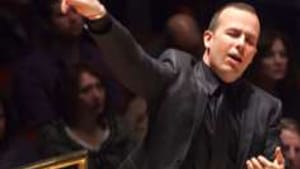Stay in the Loop
BSR publishes on a weekly schedule, with an email newsletter every Wednesday and Thursday morning. There’s no paywall, and subscribing is always free.
Bruckner, unhurried and very Austrian
Yannick's new take on Bruckner

Anton Bruckner's symphonies can be interpreted in many ways, depending on who's conducting.
Some conductors treat his music as an extension of Richard Wagner's. Bruckner was influenced by Wagner, and he dedicated his Seventh Symphony to Wagner's patron, King Ludwig II of Bavaria. The Adagio movement of that symphony, which features four Wagner tubas, was inspired by the news of Wagner's death in 1883.
Others try to play Bruckner in the tradition of German classical composers. Roger Norrington's recent swift recording from Stuttgart was marked by the absence of vibrato from the strings. Norrington took 15 minutes for his first movement.
Yannick Nézet-Séguin has chosen a different approach— the polar opposite of Sir Roger's. His first movement of Bruckner's Seventh last weekend took a spacious 21 minutes— which makes sense, when you think about it.
World without cell phones
To appreciate Bruckner, you need patience and unhurried contemplation, because Bruckner had a different sense of time from our own. As I noted when Yannick conducted Franck and Brahms in 2009, those composers lived in a time free of distractions from BlackBerries or cell phones, not to mention land lines, radio, TV or recordings. In those days, concerts provided leisurely immersion in beautiful sounds— and the longer they were stretched out, the better. The same applies to anyone listening to Bruckner.
Never have I heard Bruckner sound so Austrian as he did last weekend under Yannick's baton— not Classical, not Wagnerian, but relaxed in an Austrian way. While Bruckner's works represent somewhat of a continuation of the German symphonic tradition, the composer was raised in a rural area of Austria. Instead of creating a Brucknerian cathedral of sound (prompted by the composer's profession as a church organist), this performance seemed to go outdoors. Yannick brought sunshine in.
This expansive music covers wide territory on its way to a climactic mountain peak. Along the way, we heard rustic country dances and a hint of Schubert.
In one room together
The Orchestra sounded lyrical and loving as Nézet-Séguin applied the rich Philadelphia Sound, using a considerable amount of tremolo and vibrato.
The opening piece on the program— Wagner's Siegfried Idyll— was perfectly chosen, not only because it was written by Bruckner's icon but because of its lyric, contemplative nature.
In any case, I wish I could get Yannick Nézet-Séguin and Roger Norrington in the same room to debate Bruckner. That discussion might be almost as stimulating as listening to Bruckner's music.
Some conductors treat his music as an extension of Richard Wagner's. Bruckner was influenced by Wagner, and he dedicated his Seventh Symphony to Wagner's patron, King Ludwig II of Bavaria. The Adagio movement of that symphony, which features four Wagner tubas, was inspired by the news of Wagner's death in 1883.
Others try to play Bruckner in the tradition of German classical composers. Roger Norrington's recent swift recording from Stuttgart was marked by the absence of vibrato from the strings. Norrington took 15 minutes for his first movement.
Yannick Nézet-Séguin has chosen a different approach— the polar opposite of Sir Roger's. His first movement of Bruckner's Seventh last weekend took a spacious 21 minutes— which makes sense, when you think about it.
World without cell phones
To appreciate Bruckner, you need patience and unhurried contemplation, because Bruckner had a different sense of time from our own. As I noted when Yannick conducted Franck and Brahms in 2009, those composers lived in a time free of distractions from BlackBerries or cell phones, not to mention land lines, radio, TV or recordings. In those days, concerts provided leisurely immersion in beautiful sounds— and the longer they were stretched out, the better. The same applies to anyone listening to Bruckner.
Never have I heard Bruckner sound so Austrian as he did last weekend under Yannick's baton— not Classical, not Wagnerian, but relaxed in an Austrian way. While Bruckner's works represent somewhat of a continuation of the German symphonic tradition, the composer was raised in a rural area of Austria. Instead of creating a Brucknerian cathedral of sound (prompted by the composer's profession as a church organist), this performance seemed to go outdoors. Yannick brought sunshine in.
This expansive music covers wide territory on its way to a climactic mountain peak. Along the way, we heard rustic country dances and a hint of Schubert.
In one room together
The Orchestra sounded lyrical and loving as Nézet-Séguin applied the rich Philadelphia Sound, using a considerable amount of tremolo and vibrato.
The opening piece on the program— Wagner's Siegfried Idyll— was perfectly chosen, not only because it was written by Bruckner's icon but because of its lyric, contemplative nature.
In any case, I wish I could get Yannick Nézet-Séguin and Roger Norrington in the same room to debate Bruckner. That discussion might be almost as stimulating as listening to Bruckner's music.
What, When, Where
Philadelphia Orchestra: Wagner: Siegfried Idyll; Bruckner, Symphony No. 7 in E major. Yannick Nézet-Séguin, conductor. January 24-25, 2013 at Verizon Hall, Kimmel Center, Broad and Spruce Sts. (215) 893.1999 or www.philorch.org.
Sign up for our newsletter
All of the week's new articles, all in one place. Sign up for the free weekly BSR newsletters, and don't miss a conversation.

 Steve Cohen
Steve Cohen